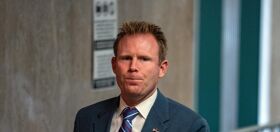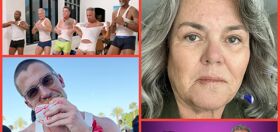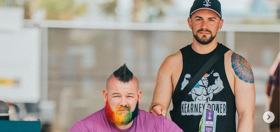[flv:http://video-cdn.abcnews.com/090610_gma_kiva.flv https://queerty-prodweb.s3.amazonaws.com/2009/06/kivavidbug.jpg 600 320]
QUEERTY APPROVED — Kiva is the remarkable micro-lending service that for years connected average Joes with a few bucks to spare with struggling entrepreneurs around the world (in Africa, Asia, South America) who sometimes needed just $25 to buy new supplies their grocery store, or $100 to buy more feed to raise farm animals they would later sell in a market. One or more lenders can donate to a needy borrower; Kiva handles sending the cash to a local micro-finance institution that facilitates the work on the ground. Thus far, Kiva hasn’t worked with small businesses in the U.S. That’s just changed: Kiva added the U.S. as its 45th country. It’s already facing criticism about extending help to Americans, who are generally better off than those in, say, Sub-Saharan Africa. But we’re all for helping any entrepreneur, no matter her geography, in need of a few dollars to keep on chugging, especially when America’s own credit market is extremely tight.




















Amaturus
Microlending schemes have stagnated in the US since at least the late Clinton years when a group connected to Dr. Yunus’ Grameen Bank tried to enter the market (http://www.grameenamerica.com/). That’s not to say there isn’t a place for microfinancing, but fortunately it really isn’t that difficult to earn a few hundred dollars in this country, so the reach of a microlending institution will always be more limited here than it is in Bangladesh or Indonesia. I do recommend Dr. Yunus’ books on the subject (“Banker to the Poor” and “A World without Poverty”). His works of social entrepreneurship have lifted millions out of the cycle of poverty in some of the poorest countries in the world, so he definitely deserved the Nobel Peace Prize he won in 2006.
Quinn
This is excellent news, Queerty. Thanks for sharing it. I’ve long been a fan of Kiva, and when I was living in India is was great to see just how much of an impact these programs can have.
galefan2004
This country is not better off than a lot of the third world. A great deal of this country is better off than the third world, but there are areas (especially Appalachia and inner city areas) that are just as bad off or worse than African areas. It is sad that one of the richest nations in this world has such areas.
Dennis
Great post…not everyone in the US is wealthy, or has access to the resources which could help make them more successful and/or more self reliant.
Why this program has a high success rate, is that it is not some “trickle down” bullshit, where we FIRST allow the already rich to get even richer b4 any benefit is seen amognst anyone ‘lower down on the food chain’ (i.e. tax cuts for the nation’s top income brackets). Direct donation/assistance to a motivated and properly selected recpient is one of the most effective ways to break the cycle of poverty.